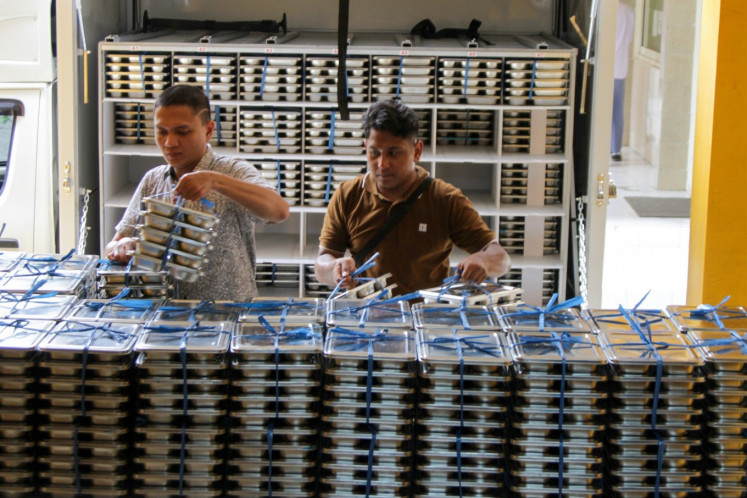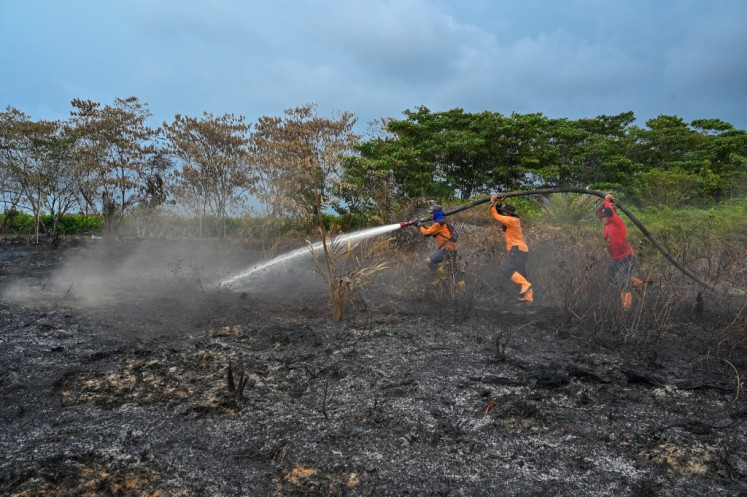Komnas HAM rejects official bid on rights abuse solutions
The government’s recent plan to resolve past gross human rights abuses out of court has been met with repudiation from the National Commission on Human Rights (Komnas HAM) and rights campaigners
Change text size
Gift Premium Articles
to Anyone

T
he government’s recent plan to resolve past gross human rights abuses out of court has been met with repudiation from the National Commission on Human Rights (Komnas HAM) and rights campaigners.
The idea was recently floated by Coordinating Political, Legal and Security Affairs Minister Wiranto, who said the government was considering establishing an interdepartmental task force to break the long-standing impasse.
The task force would comprise the Attorney General’s Office (AGO), Komnas HAM, the National Police and the Law and Human Rights Ministry. Together, they would start with finding out why all the efforts to resolve the past atrocities have stalled and offer reconciliation as a breakthrough.
Among the major rights abuses that remained unsettled are the 1965 massacres of suspected communists, the 1982 mysterious shootings or “Petrus”, the 1989 killing of suspected extremists in Lampung and the shootings of student protesters in 1998 and 1999.
But Komnas HAM said any out-of-court bids would be illegal.
Komnas HAM commissioner Amiruddin Al Rahab told a press briefing on Monday that it would not join the task force, saying any involvement in such a team would be contradictory to commission’s roles as stipulated in the 2000 law on human rights court.
The law mandates the commission to investigate serious human rights abuses and submit the findings to the AGO, which will prosecute the cases.
“So far we have properly performed our duty by investigating nine cases of gross rights abuse that happened between 1965 and 2003 and submitted the findings to the AGO,” Amirrudin said.
The law stipulates that once the AGO completes its investigation, it has the obligation to bring the case to an ad hoc human rights court. Although the law does not specifically forbid formation of a truth and reconciliation body, it states that such an institution must be regulated under a different law.
The problem is that currently Indonesia has no law providing a basis for settlement of rights abuse through the truth and reconciliation process. This, commissioner Chairul Anam said, means that the government would violate the law on human rights court should it insist on going ahead with Wiranto’s plan.
Besides, the government’s proposal makes it sound like reconciliation is the only way to resolve abuse cases, activists say.
Amnesty International Indonesia’s campaign manager Puri Kencana said the government still had other options, for example by taking alleged perpetrators to court or by following up on the recommendations made in 2009 by the House of Representatives’ special committee for missing persons.
The 2009 recommendations suggested that the government establish an ad hoc human rights court to resolve forced disappearances of 13 pro-democracy activists in 1997 and 1998, as well as rehabilitate the victims’ families.
The Institute for Policy Research and Advocacy (ELSAM) is another advocate of legal solutions to past rights cases — which have become a flashpoint in Indonesian politics.
ELSAM researcher Wahyudi Jafar said by resolving the cases in court, the government would also be held accountable for victims’ and their families’ rehabilitation process.
He said the public should be skeptical about the interdepartmental task force that Wiranto proposed given that human rights issues have long been politicized for election purposes.
Presidential spokesperson Johan Budi refused to give details on the reconciliatory initiative, but said “the President [Joko “Jokowi” Widodo] has ordered the Attorney General and [Wiranto] to settle the disputes”.
Resolving rights abuses is part of Nawa Cita, the President’s nine-point development program. Although Jokowi has made some efforts to resolve past abuse cases, such as organizing a national symposium in 2016, little has been done ever since. (ris)
— Marguerite Sapiie Afra contributed to the story.









